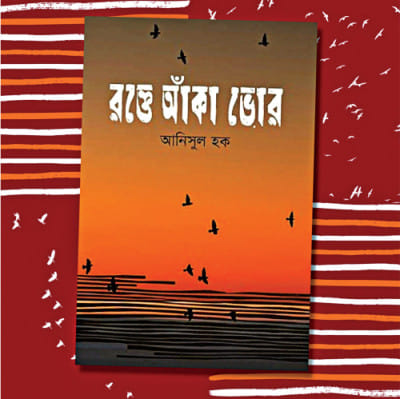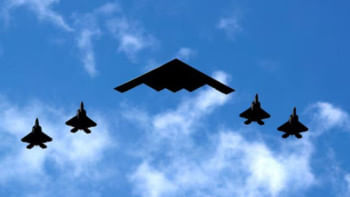‘Rokte Aka Bhor’: Anisul Hoque’s epic novel commemorates 50 years of liberation

Anisul Hoque's most recent novel, Rokte Aka Bhor (Prothoma Prokashon, 2021), is a work of historical and political fiction that was released on the occasion of 50 years of Bangladesh's independence. Against a vast canvas, Hoque paints meticulously a narrative that will serve as a historical documentation for years to come—rich, albeit fictionalised, it is a portrayal of Bangabandhu Sheikh Mujibur Rahman's assasination.
Rokte Aka Bhor is the sixth and the last of the novels in the same series, the first of which was Jara Bhor Enechhilo (Prothoma Prokashon, 2012). This last instalment in the series begins in March 1971, unfolding in a year of bloodshed and resistance, and it opens with the arrest of Bangabandhu Sheikh Mujib, his revolutionary declaration of independence, and the barbaric murder of East Pakistanis in Bengal.
Hoque depicts several known and unknown events in the novel spanning from March to August and from October to December of 1971. He paints a vibrant picture of Dhaka all the way to Kurigram, and from Kolkata to Delhi. And masterfully, he conceives the image of the traitors who penetrated the depths of the country at the time.
In a nerve-racking response, Hoque also recounts the tragic murder of Dhirendranath Dutta, a hero of the language movement of 1952. He describes the story of this patriotic man in stirring details.
On the one hand, Bangabandhu is held captive in a Pakistani prison, in the novel, and on the other hand, his family, terrified for him and in danger with their own lives in this land, are foregrounded in the book. While he is being taken away from his home in Dhanmondi 32, Begum Mujib takes refuge next door. The country is rampant with murder and massacre. Meanwhile, Bengali soldiers, the police, EPR, Ansar, students, and people from all walks of life are building resistance against the Pakistani oppressors. But Bangabandhu's death sentence is being arranged in a secret military court.
While the expatriate Bangladeshi government is formed under the leadership of Syed Nazrul Islam and Tajuddin Ahmed, millions of people cross the border and take refuge in India, and the Mukti Bahini is formed. Various conspiracies had already started against the Mujibnagar government by then. Against this setting we encounter characters such as Professor Anisuzzaman, Sepoy Hamidur Rahman, Munir Chowdhury, the tragic condition of his family after losing Dr Alim Chowdhury, and the misery of the wife and family of author Shahidullah Kaiser, people who will become integral pillars in the story of the nation's history.
The novel ends with Bangabandhu returning to the newly independent country on January 10, 1972. Apart from the Liberation War, this work also extends itself as a documentation in gratitude to the Soviet government, the late Prime Minister of India, Indira Gandhi, the poet Allen Ginsberg, and more.
Hoque has been working on Rokte Aka Bhor since writing the first book of the series 13 years ago, and in it he depicts the long struggle behind the epic war. Other books in the series include Jara Bhor Enechilo (2012), Ushar Duare (2013), Alo Adharer Jatri (2018), Ei Pothe Alo Jele (2019), and Ekhane Themo Na (2020).
Shah Alam Shazu is a writer and journalist.

 For all latest news, follow The Daily Star's Google News channel.
For all latest news, follow The Daily Star's Google News channel. 



Comments